For the 63rd year in a row, the American Society of Hematology (ASH) hosted the Annual Meeting & Exposition. ASH is one of the world’s largest professional organizations made up of physicians and scientists with a keen interest in tackling blood diseases. This annual ASH conference is attended by approximately 25,000 participants, mainly hematology professionals, who gather to discuss the latest research and updates in topics across both malignant and non-malignant hematology. This year, members from around the world met in a hybrid – both in-person and virtual – format.
Every year, we celebrate the Weill Cornell Medicine (WCM) Lymphoma Program team members whose new discoveries and research in lymphoma are selected for presentation at the ASH meeting. Throughout the 2021 ASH conference, we covered these research updates via our Twitter feed, including perspectives and insights into original research coming out of our basic science laboratories as well as translational and clinical research studies. Dr. John Leonard shared what he found to be the top 10 most impactful and important lymphoma research abstracts as part of the #LeonardList: a yearly countdown on Twitter leading up to the annual ASH meeting which, for the fourth year in a row, has been accompanied by a CancerCast podcast episode. In this special edition of CancerCast, listeners are able to hear directly from Dr. Leonard regarding the “why” behind his #LeonardList selections, as well as gain access to 5 additional bonus podcast-only choices. Each year the Leonard List provides insight into research that is changing the treatment landscape for lymphoma patients, as well as other important issues lymphoma patients face such as financial toxicities and disparities in care. Listen to the teaser clip below for a sneak peek and tune in to CancerCast for the full episode available on Apple Podcasts, Google Podcasts, Spotify, or online at Weill Cornell Medicine.
This year’s ASH meeting heralded amazing research achievements in all sectors of hematology. Notably, within the field of lymphoma, presentations at ASH 2021 demonstrated scientific and treatment advancements that may carve the way for more targeted therapies and improved outcomes for patients. The WCM team shared research updates across many different types of lymphoma. While most abstracts dove deeply into one form of the disease, some presented on research that combined work in multiple types of lymphoma.
This research involving Dr. Richard Furman and colleagues from around the country evaluated a novel antibody-drug conjugate targeting a surface protein found in many cancers. Encouraging results were seen in the current phase I study, including high response rates in heavily relapsed and refractory mantle cell lymphoma (MCL) and diffuse large B-cell lymphoma (DLBCL) patients.
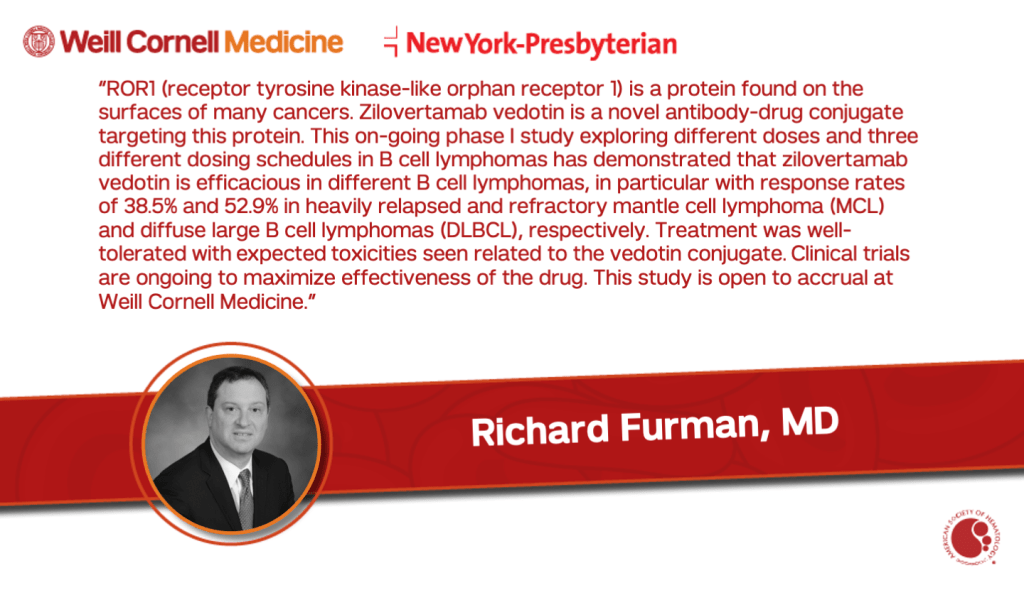
Here is a breakdown of some of the additional great lymphoma work that WCM physicians and researchers shared throughout the ASH 2021 meeting.
B-Cell Lymphoma
Diffuse Large B-Cell Lymphoma (DLBCL)
In collaboration with Dr. Ari Melnick’s lab, Dr. Madhav Seshadri – Chief Hematology & Oncology Fellow at Weill Cornell Medicine and NewYork-Presbyterian Hospital – presented lymphoma research which revealed a novel target and new type of agent that could ultimately lead to more treatments for DLBCL patients who have dependency on the protein MALT1.

Dr. Rossella Marullo, a 2020 ASH Scholar Award Recipient and current Instructor in Medicine at WCM, presented an oral abstract on work performed in collaboration with Dr. Leandro Cerchietti’s lab. The WCM team discovered changes in gene expression linked to aging that could explain why older lymphoma patients have a harder time tolerating certain treatments. This has important implications for the future development of therapies that may be better tolerated and result in higher cure rates for older lymphoma patients.
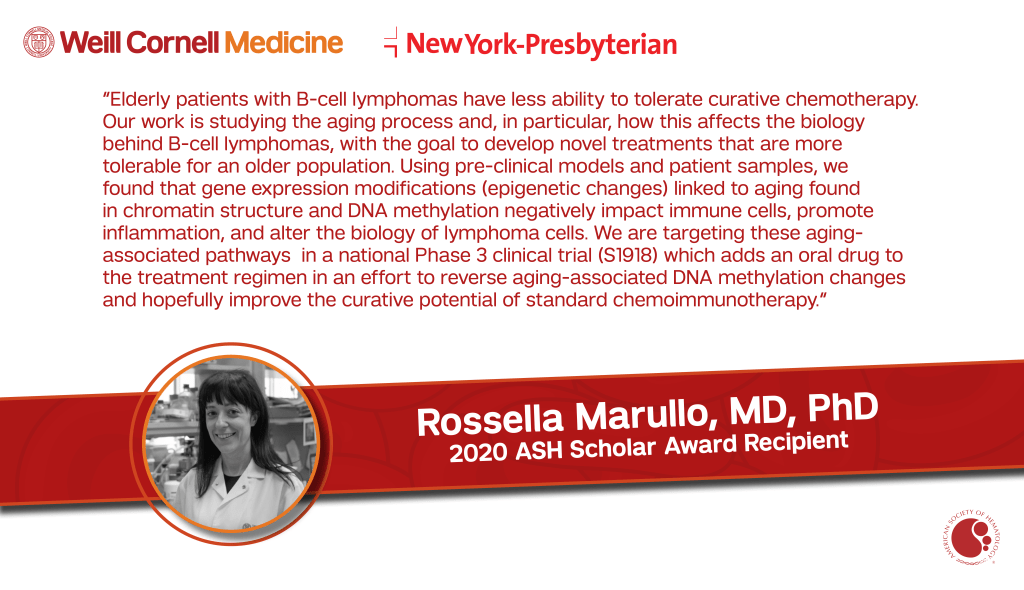
Work by Dr. John Leonard and colleagues from across the country as part of the National Cancer Institute (NCI) Alliance, a cooperative clinical trial group, was featured in an oral presentation. The study demonstrated the feasibility of prospective clinical trials for certain lymphoma patients, specifically two DLCBL subtypes, double hit and double expressor lymphoma.

Dr. Coraline Mlynarczyk, a post-doctoral fellow in Dr. Ari Melnick’s laboratory and ASH 2021 Scholar Award Recipient, presented new research findings demonstrating that BTG1 mutations can lead to more aggressive B-cell lymphomas, like DLBCL. Exploiting this genetic vulnerability could ultimately lead to the creation of new targeted therapies for patients with this aggressive form of lymphoma.
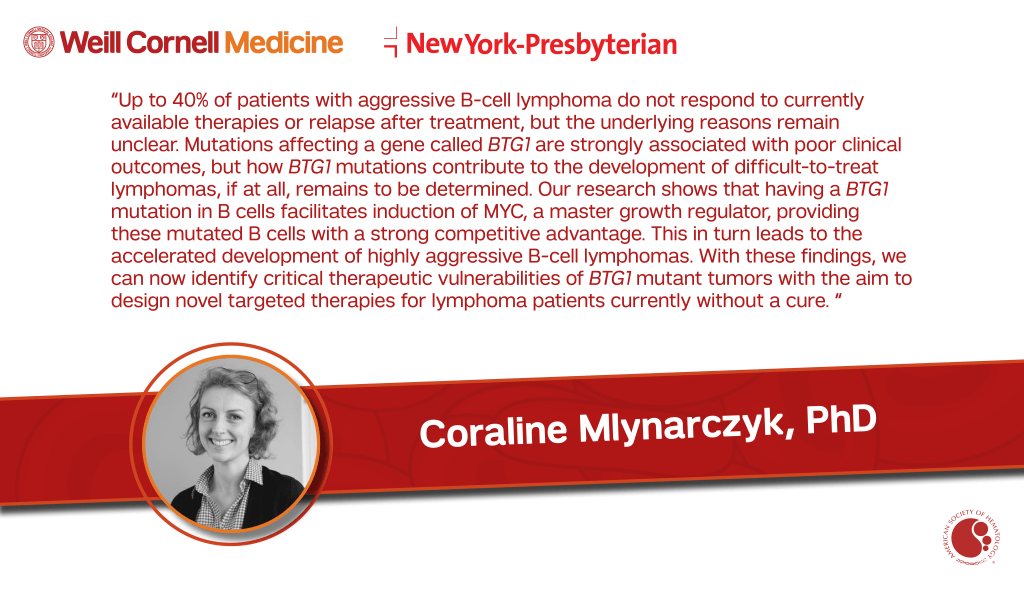
Follicular Lymphoma (FL)
Weill Cornell medical student, Danny Luan, MPH, presented work conducted under the mentorship of Weill Cornell Lymphoma Program Chief Dr. Peter Martin. This retrospective analysis of follicular lymphoma clinical trials focused on expanding eligibility criteria to better reflect the population makeup of patients diagnosed with FL, allowing the results to be more generalizable outside of the clinical trial setting.

T-Cell Lymphoma
Dr. Jia Ruan presented her investigator-initiated phase 2 peripheral T-cell lymphoma clinical trial at ASH 2021. This multi-center clinical trial looked at the combination therapy of oral azacytidine (CC-486) plus CHOP, demonstrating impressive complete response (CR) rates of about 75%, which appears better than the CR rate of 40% that has historically been observed with standard CHOP alone. This combination will be further evaluated in a randomized study via the ALLIANCE/US Intergroup (A051902).
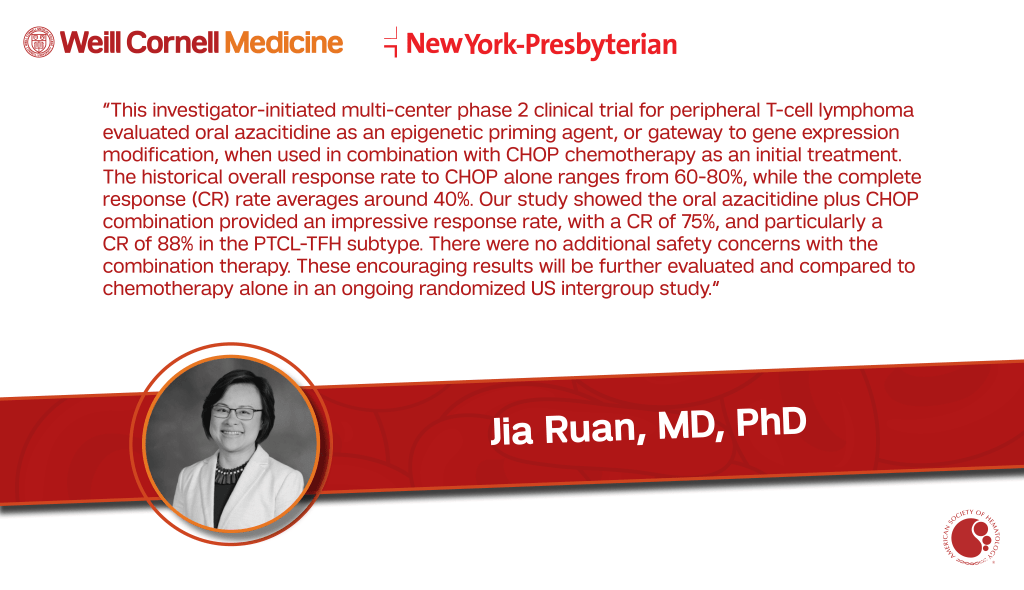
Chronic Lymphocytic Leukemia (CLL)
CLL research on a phase 3 clinical trial that Dr. Richard Furman was involved with compared two therapies, acalabrutinib and ibrutinib, for outcomes and tolerability to evaluate differences in adverse events related to long-term drug exposure in addition to cancer control. Acalabrutinib demonstrated better tolerability overall.

Dr. Richard Furman and Dr. John Allan also participated in research alongside a global team showing that certain receptor binding activities in CLL cells may explain why patients experience impairments to immune system function. This research may help to explain the underlying mechanisms behind why certain CLL treatments appear to improve immune system function.
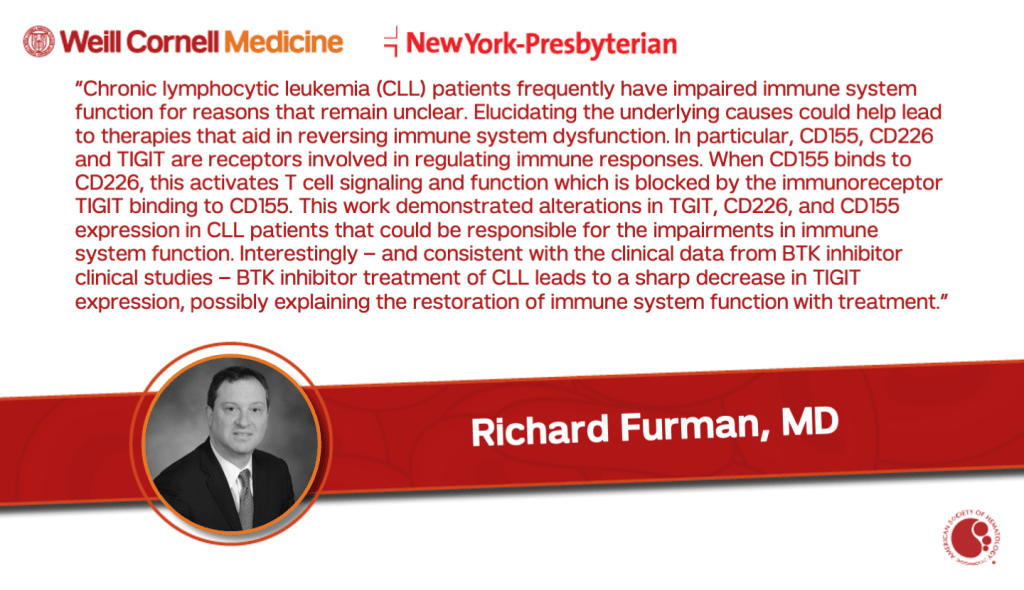
Finally, in addition to the amazing research that our team was involved with at this year’s ASH meeting, Dr. Wendy Béguelin – an assistant professor of pharmacology at WCM – was selected to speak as an ASH Scholar Award Recipient. She presented her work during two 10-minute Blood Drop sessions with the goal of educating trainees at all levels during this ASH-a-Palooza event. Dr. Beguelin’s presentation aimed to answer the question, “What can cause lymphoma?” Throughout these sessions, Dr. Beguelin explained her research on the role of EZH2 mutations in initiating cancer predispositions for B-cell lymphomas.

As always, we are incredibly proud of our team’s continued commitment to advancing the overall understanding of lymphoma biology, improving clinical outcomes, and enhancing the quality of life for all those affected by the disease. While this year’s ASH 21 meeting has come to a close, ongoing research continues at the WCM Lymphoma Program as our physicians and scientists work relentlessly to advance the field year-round.

